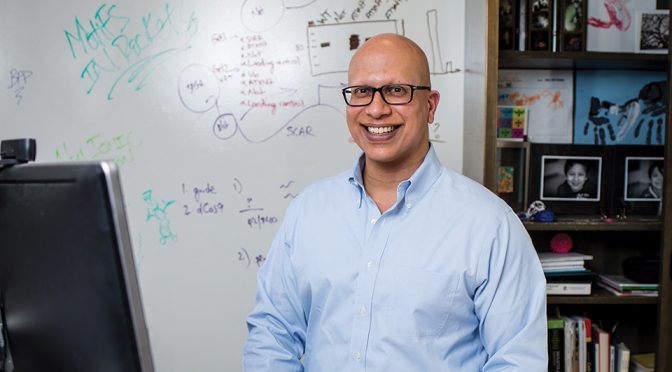What is the focus of your research?
Our team investigates how multiprotein complexes protect the brain. Learning more about the structure and function of these multiprotein complexes will help us understand why mutations, which can often occur, lead to many different diseases. In a number of neurodegenerative diseases, we know which proteins malfunction, but we don’t know precisely how these malfunctions lead to disease and possibly death.
What are the practical applications of your research?
This research could open the door to curing terrible neurodegenerative diseases such as spinocerebellar ataxia and Huntington’s. I think we are on to something and getting closer to finding the truth about these gene mutations.
Any recent discoveries?
We are studying the SAGA protein complex, which normally protects the eyes’ nervous systems from damage. We already knew SAGA could regulate gene expression – helping to decide whether to turn genes on or off. We looked for additional functions and found the complex is also a major regulator of the cytoskeletal networks that maintain cell structure and shape. This may help us understand why damaging SAGA can lead to miscommunications in the brain and possible degeneration.
How did you get interested in molecular physiology?
I was pursuing my Ph.D. at a time when it was becoming clear how critical genes and multiprotein complexes are to every aspect of body function. Filling the gaps in the scientific knowledge seemed important to me. I enjoy the day-to-day pursuit of discovery in our research.
What is a typical day like in the lab?
It is bustling. Our team has a senior scientist, two graduate students and 10 undergraduates, each working on one small part of the larger project – understanding how SAGA works to keep the nervous system healthy. We hold Skype calls with collaborators in Israel or other countries, and we meet after dinner for a lab meeting to share progress, troubleshoot difficult experiments and share new ideas.
Undergraduates are an important part of our team. They start in the lab after their freshman or sophomore year. I let them try different tasks and figure out what part of the research best suits them, then they practice and take off! We recently submitted a paper to the Journal of Cell Biology that listed six undergraduates as co-authors.

